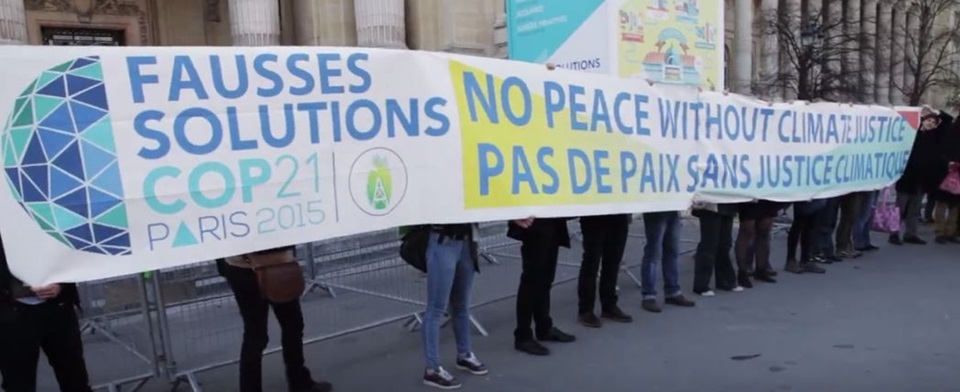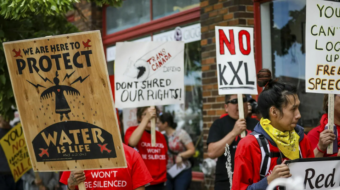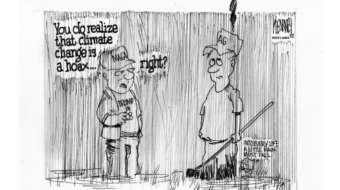
“Grossly insufficient” and “incoherent” are among the terms being used to describe a deal reached by delegates at the COP28 summit, in which it was declared that the world must transition away from fossil fuels. “Transition” was the term climate activists took umbrage with most, at a time when it feels imperative that the world must break away entirely from oil and gas altogether.
This year’s UN climate summit was held in Dubai, and has been the source of ongoing controversy due to its president, Al Jaber, just so happening to be the CEO of the Abu Dhabi National Oil Company, putting his agenda at immediate odds with that of COP28 in the eyes of many. He predictably used the event as an opportunity to bankroll his company’s fossil fuel projects and cut dirty energy deals with world and business leaders, all the while carrying on an obvious charade during his speeches at the summit.
This same oil boss praised the deal struck on Dec. 12, remarking, “We have language on fossil fuels in our final agreement for the first time ever.” He has described meeting the goal of the 2015 Paris Agreement – a reduction of the Earth’s warming by 2.7 degrees Fahrenheit above pre-industrial levels – as his “north star” and guiding principle. The deal’s aim, however, of getting the world to net zero greenhouse gas emissions by 2050, is highly unlikely given Al Jaber’s refusal to take a hard line on fossil fuels. Instead, the naïve goal of a “transition” away from such energy is little more than ineffectual mealy-mouthing at a time when the world is set to reach peak carbon pollution by 2025.
Outspoken activists have already disagreed with the supposedly historic deal, noting that the “north star” goal of the Paris Agreement is farther out of reach than ever before. This, at least, was the sentiment of Asad Rehman, executive director of War on Want, a London-based anti-poverty charity, and a coordinator of climate justice movements. “This outcome isn’t the clarion call that was needed to prevent catastrophe,” he said. “It still leaves us with our planet on fire, the poor left behind, and fossil fuel CEOs rubbing their hands with glee. And like emperors with no clothes, Britain, the U.S., and the EU point blank refused to even discuss cutting their own emissions.”
The proof of the deal’s redundancy can be found by reading the very language of the UN Intergovernmental Panel on Climate Change, the main scientific body that informs the UN Framework Convention on Climate Change. Meeting that 2.7 degree goal, it states, without overshooting that limit by too far, would require rapidly cutting greenhouse gas emissions – cutting, not transitioning.
Former U.S. vice president Al Gore commented, “The influence of petrostates is still evident in the half measures and loopholes included in the final agreement.”
Summit attendee John Silk, head of delegation for the Marshall Islands, denounced the deal, stating, “I came here from my home in the islands to work with you all to solve the greatest challenge of our generation. I came here to build a canoe together for my country. Instead we have built a canoe with a weak and leaky hull, full of holes, and we have put it in the water.”
Romain Loualalen, head of global policy for NGO Oil Change International, said that the deal’s text simply “risks giving big polluters a free pass to continue extraction at a time when swift and coordinated action is desperately needed.”
Alok Sharma, the President of COP26 two years prior, said that only a deal including very specific, clear language on phasing out fossil fuels would be sufficient in maintaining the momentum needed to meet the global warming limitations of the Paris Agreement. “I think the consequences are going to be grave,” he warned.
Though UN climate chief Simon Stiell was somewhat satisfied with the outcome, he acknowledged that “we didn’t turn the page on the fossil fuel era in Dubai. We’re currently headed for just under 3 degrees. COP28 needed to move the needle further; this still equates to human suffering.”
We hope you appreciated this article. At People’s World, we believe news and information should be free and accessible to all, but we need your help. Our journalism is free of corporate influence and paywalls because we are totally reader-supported. Only you, our readers and supporters, make this possible. If you enjoy reading People’s World and the stories we bring you, please support our work by donating or becoming a monthly sustainer today. Thank you!










